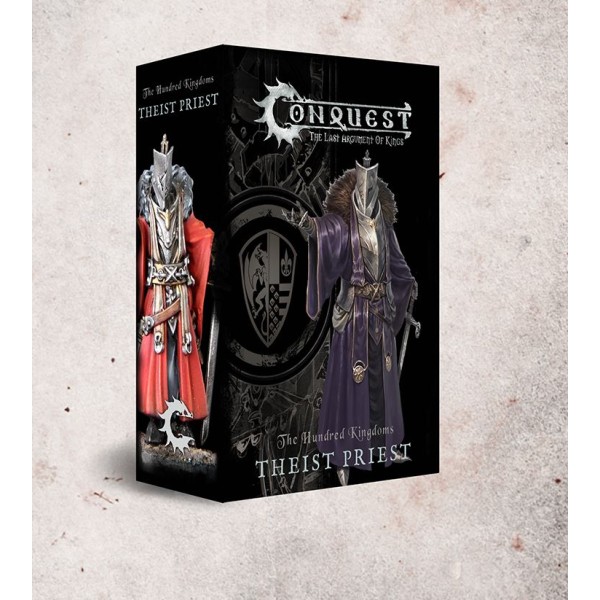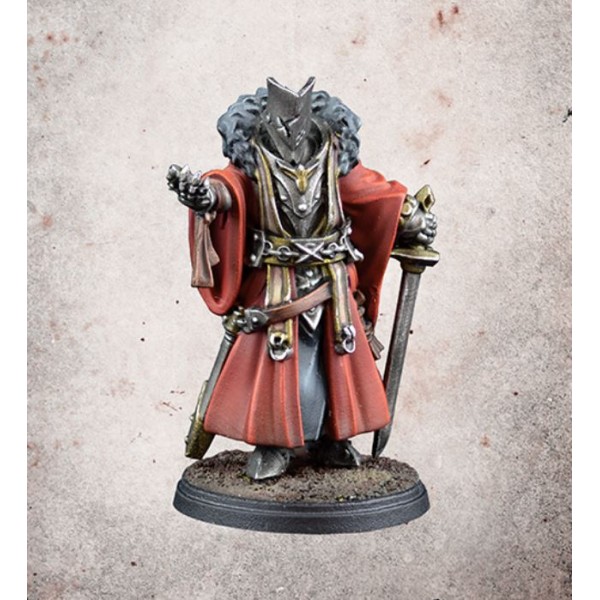Conquest - The Last Argument of Kings - The Hundred Kingdoms - Theist Priest
- Product Code: PARPBW7221
- Availability: 1
-
- Ex Tax:
Theist Priest
The Hundred Kingdoms
To those who are familiar with military structures and hierarchy, the structure of the Theist Church is remarkably similar to the command structures established by professional armies around Ea. It is perhaps only natural that the Theist Church has embraced the militarism that so pervades the Hundred Kingdoms. Their origins are steeped in the lore of the Old Dominion, where both steel and faith armed and armored the armies of Hazlia and the earliest records of the Church Apostles heed back to the turbulent times that followed the Fall: the Exodus and early years that named the Bitter Sea.
Yet for all of its military character and early militarism, the Theist Church is barred from maintaining a force under arms by one of the most powerfully enforced laws in the Hundred Kingdoms, the ‘Animus Possidendi’. This Decree was issued by Charles Armatellum himself and has survived his death, the end of his line and even the partial collapse of the Empire.
Since the death of the last Emperor, the Theist Church has, time and again, attempted to strike down this law but to no avail. While the influence of the Orders, the original backers and most fervent supporters of this law, was vastly diminished with the collapse of the Empire, the nobility are very reluctant to see another party wield military might, an area in which they hold an unopposed monopoly in the Empire and have thus not supported it.
The debacle that started the Red Years, a decades long conflict that threatened to sunder the early Empire, gave the Theist Church some wiggle room. The persecution and martyrdom of Saint Nikolas provided the Church with the legal and political ammunition it needed to ensure that, while no ordained priest could command or lead men under arms, they were allowed to defend themselves. To this end, ordained members of the Theist Church would have the same rights to bear arms and armor as the nobility, but much more importantly, the Church would be allowed to legitimize the feared Sicarii, fanatical warrior monks, as a genuine bodyguard. While practical impact of gaining the right to bear arms and the establishment of a very limited armed force are minor, the political and psychological consequences cannot be overstated.
With the Orders all but muzzled, the strong ties of some Noble Houses have with the Theist Church have begun to tell. Adopting religious symbols into their military banners, these noble houses have taken up the cause of the Theist Church, or at least use religion as a stepping stone to further their own goals. Their motivation matters little to the Paeneticum, and the leadership of the Theist Church has been very quick to respond to this new trend, ordaining large numbers of young nobles, thus creating strong bonds with their families. More importantly, however, it founded a series of new ordinariates, led by bishops, responsible for the pastoral care of military troops. These ordinariates were first established with the troops of their allied noble families and have proven their worth to commoner and noble alike. After all, common reason argues, even troops need their spiritual guides at their sides. Who needs to confess more than a soldier who kills, who needs their
spirits strengthened more than those who face the horrors of battle and do they not have the right to have their last rites read to them?
In the end, the legality of the issue matters little. The plain truth is that Theist Priests openly walk the field of battle once more. Surrounded by their Sicarii and the devout while wielding the power of Theos himself through their prayers, fewer commanders inspire greater devotion and respect.


